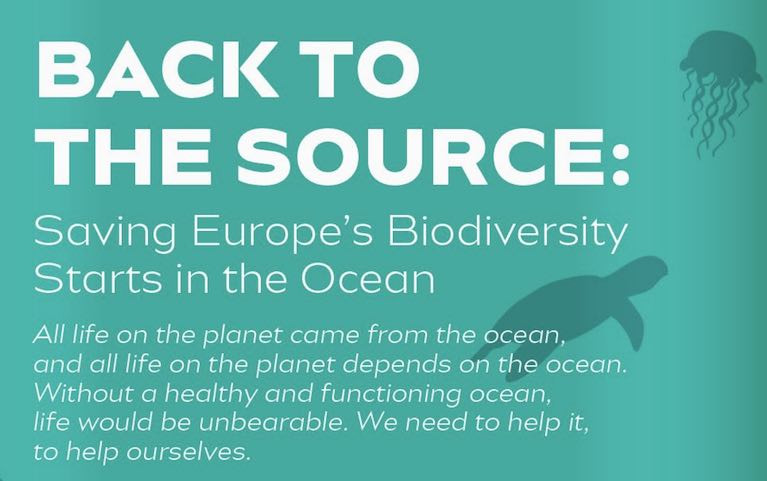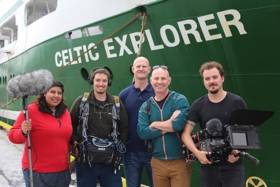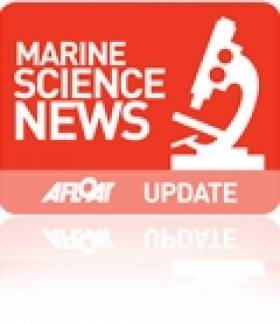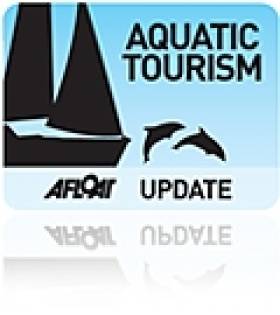Displaying items by tag: marine life
Environmental Groups Identify "Marine Policy Gaps" in EU Biodiversity Strategy 2030
A coalition of environmental groups says there are “key marine policy gaps” in the EU’s Biodiversity Strategy 2030.
“Tangible and binding” actions must be taken to ensure the proposed biodiversity strategy ensures “the long-term health” of oceans, the group of environmental non-governmental organisations (NGOs) state.
The group has recommended ten “actions” which it has forwarded to EU “decision-makers”, as in the European Commission, EU member state ministers and members of the European Parliament.
The joint paper entitled Back to the Source - Saving Europe’s Biodiversity Starts in the Ocean, has been published by groups including BirdLife Europe, BLOOM, ClientEarth, Deep Sea Conservation Coalition and the Greenpeace European Unit.
Groups also involved include the International Fund for Animal Welfare, the Mediterranean Association to Save Sea Turtles IFAW, Oceana in Europe, Our Fish, Sciaena, Seas At Risk, The Nature Conservancy, and WDC - Whale and Dolphin Conservation,
The paper calls for existing enabling legislation to be implemented, noting the EU Birds and Habitats Directives require that marine protected areas (MPAs) be created and managed.
Under the Marine Strategy Framework Directive, EU member states have a duty to ensure their seas are in “good environmental status” by 2020, it points out, while the Common Fisheries Policy is meant to follow an “ecosystem-based approach”,
The Deep-Sea Fisheries Regulation provides extra protection for vulnerable deep-sea marine ecosystems, while the Aarhus Convention provides for EU citizens to participate in environmental decisions that affect them.
Enforcement action to ensure these pieces of legislation are implemented in all member states “needs to be dramatically ramped up”, it says.
The paper also recommends developing an EU action plan to protect marine ecosystems and fisheries resources by including “precautionary buffers for climate change when setting fishing limits”
It calls for a “clear and transparent set of environmental and social criteria for allocation of fishing quotas”, along with a “drastic improvement in the control of fishing activities, including a transition to mandatory remote electronic monitoring systems (REM) for all fleets”.
It calls for a focus on “robust long-term monitoring of sensitive species” and “application of measures to prevent and mitigate bycatch of sensitive species”.
It also calls for an end to what it describes as “destructive” practises including bottom trawling in all EU MPAs.
The group recommends ending other destructive practices such as hydrocarbon exploration in MPAs, and ensuring “at least 30% of EU oceans fully or highly protected, as recommended by science in the next decade;
It also recommends making a plan to restore EU marine biodiversity, by setting a restoration target of at least 15% of EU seas, and focusing on “those ecosystems with the most potential to capture and store carbon”
It calls for an end to “harmful subsidies” in the fishing sector, and says it has estimated that in 2018, the EU “handed out over two billion dollars in capacity-enhancing subsidies”.
Many of these subsidies go to “suppliers and vessel owners” while the income of fishing crews does not increase, it points out.
It says there should be a “coherence between EU commitments and its subsidies policies for the fishing sector”, such as the new European and Maritime Fisheries Fund and revised State Aid Guidelines
It also calls for more “urgent and stringent measures” on noise pollution, stating that sudden noise sources include explosions, seismic airguns, pile driving and military exercises using sonar have a negative impact on marine life.
Sustainable fisheries partnership agreements for EU vessels fishing in distant waters should also be reviewed, it says so they “do not contribute to overfishing” and “do not negatively impact the economic activities of local coastal communities and artisanal fleets”
It calls for work to “achieve a moratorium on deep-sea mining, including at the International Seabed Authority”, and the cessation of funding for the development of deep-sea mining technology.
The publication is available here
The BBC One Show Captures Marine Wildlife in Irish Waters
For the first time, a BBC One television crew joined a Marine Institute scientific survey, in search of seabirds and marine mammals in the offshore waters around Ireland and Scotland. Their voyage on the marine research vessel RV Celtic Explorer, was recently screened on The BBC One Show as a four-part series.
The BBC One television crew members joined scientists undertaking the WESPAS (Western European Shelf Pelagic Acoustic) Survey in July 2017.
The WESPAS survey is an annual acoustic survey of herring and boarfish in the oceans to the north, west and south of Ireland, and west of Scotland to determine the distribution and abundance of herring and boarfish stocks.
In the first episode, Chief Scientist from the Marine Institute Michael O'Malley shows BBC's Mike Dilger the route the RV Celtic Explorer will travel over the next 22 days, a the second part of a survey covering more than 5,000 nautical miles in total. After only a few hours into the survey, a huge pod of Common Dolphins surrounds the RV Celtic Explorer.
In episode two, and a week into the voyage and 100 miles from shore, the crew experience hostile weather conditions, and the RV Celtic Explorer sails through a Force 8 gale. Mike Dilger speaks to experienced fisherman and crewman aboard the RV Celtic Explorer Frank Kenny about the dangers of fishing. Near the Continental Shelf, several Risso's Dolphins are spotted leaping out of the water.
In episode three, Aidan Long, PhD student from NUI Galway, shows Mike Dilger how plankton samples are collected by the towed Gulf sampler, and views gelatinous zooplankton under the microscope. As the survey rounds the Butt of Lewis to the north of the Hebrides off the west coast of Scotland, Minke Whales can be seen close to the RV Celtic Explorer.
The final episode sees a huge flock of Gannets surround the RV Celtic Explorer, as scientists continue to catch fish for analysis. A Fin whale, the second largest mammal on the planet, is also spotted in the distance sprouting water 10 metres into the air. As the survey passes through the North Channel off the north east coast of Ireland, a Thresher shark leaps out of the water only metres from the vessel.
Irish Lead Mission to Find New Life on the Ocean Floor
An Irish-led marine research mission has set off to discover strange new lifeforms that inhabit the deepest parts of our oceans.
In collaboration with scientists from the UK’s National Oceanography Centre, the team sailed from Galway earlier this week bound for the Mid-Atlantic Ridge to investigate life at 3,000m below the surface of the sea.
Using a remotely operated vehicle (ROV) they will explore for the first time the 45o North MAR hydrothermal vent field, where vents spew mineral-rich seawater heated to boiling point in the earth’s crust. These are home to a rich variety of marine life that thrives in complete darkness on bacteria fed by chemicals.
Patrick Collins from NUI Galway’s Ryan Institute will lead Ireland's marine biological team investigating this unique ecosystem, which could tell us not only about how life might have evolved on other planets, but may also be a rich source of new biochemical processes with valuable medical and industrial applications.
"There is potential here to put Ireland on the global map as a serious player in deep sea science," said Collins. "This is all the more timely with the exploitation of deep sea and hydrothermal vents for precious metals and rare earth minerals now a reality.”
The mission carries geochemists, marine biologists, marine geologists, marine geneticists and technicians from Ireland and the UK as well as a three-person TV crew from National Geographic.
They will spend 25 days at sea and will be posting a regular blog on scientistsatsea.blogspot.com.
Seaweed Experience in West Cork
Seaweed picking is just one example of many 'green' tourism breaks now available in Ireland, according to The Irish Times.
Inchydoney Island Lodge and Spa in West Cork offers a two-night 'seaweed experience' for those looking for a more responsible, activity-based weekend away.
Aside from the typical spa treatments such as seaweed baths, local experts will take visitors seaweed foraging by kayak, while also educating about the area's natural beauty and abundant marine life.
Seaweed was once a staple of the Irish diet, and this break aims at a revival of the versatile superfood by showing how it can be used in a variety of dishes.
The Irish Times has more on the story HERE.
































































